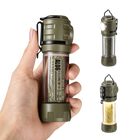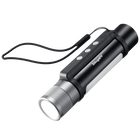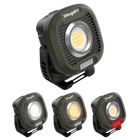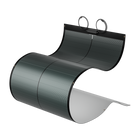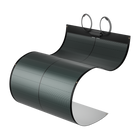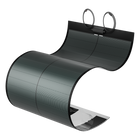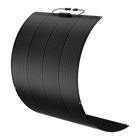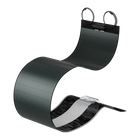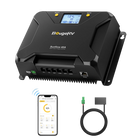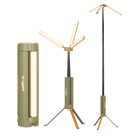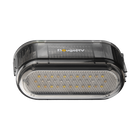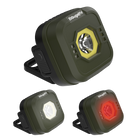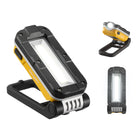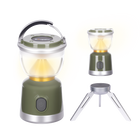100w vs 200w Solar Panel: Differences And More


Imagine that you are camping at the beach. The sun is just setting and everyone is having fun. Suddenly, you hear a series of loud beeps from your Bluetooth speaker. The rechargeable battery is just about dead. Well, if you have solar panels and a battery, all you need to do is plug in the speaker and keep the good times going.
When you decide to invest in a solar panel, the first thing you discover is a lot of confusing terms. How do you tell the difference between a 100-watt and a 200-watt solar panel? How much power does it make? How much do you need? Is it easy to set up? These are all important questions and we will answer each one. By the end of this article, you will know exactly which panel is going to work best for you.
The Difference Between 100W And 200W Solar Panels

There are some obvious differences between 100W and 200W solar panels. The main difference is the amount of power they are capable of making. There are also some other key differences you need to know before deciding on the right solar panel for you. Let’s get right into it.
1. The Size
At BougeR, the 100W solar panel sizes range from 13.7” x 85.6” x 0.06 to 52.5” x 42.4” x 0.06”. A 200W solar panel is roughly twice the size of a 100W panel when all other factors are equal. Most designs around fold up for portability and storage, but not all of them.
Size is also a factor when you are setting up a solar panel. Since the 200W panel is larger, it will require more space. Cramped camping sites might be too small to position the panel effectively.
2. The Charging Output
This is the obvious one, but it also is one of the most important. The maximum charging output of a 100W solar panel is 100 watts. The same goes for the 200W panels. In order to determine whether one or the other is the best, you will need to know what you plan to power with the panel.
For example, using solar panels to charge a LiFePO4-equipped rechargeable power station will require higher watts than using the panel to recharge a phone battery through an inverter.
A larger solar panel charges a power station faster. Small rechargeable stations that are simply intended to recharge lithium-ion batteries in phones and tablets won’t need the higher wattage to accomplish the task.
3. The Weight
The weight corresponds to the size of the panel. 200W rigid solar panels use a metal frame and a type of glass cover, and all of these parts can add up to a heavier panel. Some people will find that a heavier panel is inconvenient. Two lighter 100-watt panels are a good solution.
4. The Power Production Per Day
A solar panel is limited to not only the wattage it can produce but also the number of watts it can provide over time. Cloud cover, dense tree canopies, and even your location can impact the efficiency of a solar panel.
How Much Power Does A 100-watt Solar Panel Produce In A Day?
You can expect a 100-watt solar panel to produce about 30 amp-hours per day under good conditions. Cloudy skies or a panel that isn’t set up correctly will reduce the amount of power the solar panel can produce.
How Much Power Does A 200-watt Solar Panel Produce In A Day?
A 200-watt solar panel can produce up to about 70 amp hours per day. These panels are typically rather efficient when set up correctly.
5. The Time It Takes To Charge A Battery
All of the power numbers don’t matter when what you actually want to know is how long charging something up will take. We will explain how to calculate the amount of time for any solar panel and battery combination.
Calculating How Long It Takes to Charge a Battery With Solar Panels

The rate at which the battery will recharge depends on the capacity of the battery. For example, AAA batteries are 12v batteries that have a capacity of 1,000 mAh.
A 100-watt panel will recharge a single AAA battery in about 22 minutes under ideal conditions, called Peak Sun Hours. You can figure out how long it takes to charge any battery using the following equations. First, we calculate the battery’s watt-hours using this equation:
Watt-hours(Wh)=Amp-hours(Ah) x Volts(V)
In our example above, we figured the watt-hours like this:
1,000 mAh x 12 V = 12 Wh
Next, we factor the amp-hours of the solar panel. Since solar panels provide watt-hours, we need to convert them to amp-hours. This is the equation to do that:
Wh/Day = Watts(W) x Peak Sun Hours x 0.75
The average for Peak Sun Hours is five, with more hours in sunnier, more southern locations. Winter in the northern areas might provide just one or two hours of peak sunshine.
The factor of .75 relates to the average efficiency of a solar panel which loses about 25% of the power during transmission.
We can calculate an estimate for the output of the panel like this:
31.25 Watt-hours = 100W x 5 hours x 0.75
Now that we know the average output, we can factor how long it takes to charge the battery. This is how to make the calculation:
Charging time in hours = (Ah x V) / Solar Panel Wh Output
Now, we can solve how long it takes to charge a AAA battery.
0.384 hours = (1,000 mAh x 12 v) / 31.25 Wh
That means it will take 23.04 minutes to charge one AAA battery with one 100-watt solar panel. Using these equations, you can find the charge times for any battery, regardless of the voltage. Simply plug in the numbers and get out the calculator and you can figure out charge times easily.
Will The 100W Solar Panel Charge The Battery Quickly?
The speed at which a 100-watt solar panel can charge a battery depends on many different factors. The size of the battery, the level of discharge, the amount of sunlight, and the quality of the solar panel can all affect the speed. In general, charging batteries with a 100W solar panel is a slow process.
It can take anywhere from a short time to several days to charge a battery. A standard automotive car battery will require 15 to 20 hours of peak sunshine to fully charge.
How Long Does A 200W Solar Panel Take To Charge A Battery?
Since a 200-watt panel provides more power, it will reduce the amount of time that it takes to charge the same battery. Using the above example, it would take just 11 minutes and 30 seconds to charge a single AAA battery.
What Can I Run Off A 100W Solar Panel?
Now that we have an idea of the capabilities of solar panels, let's take a look at what you can do with them.
A 12V fridge
In theory, a 100W solar panel will power a standard 12V refrigerator. The problem is that the fridge will draw nearly the maximum amount of power, so once the sun sets, the fridge won’t work. You’ll want to use a battery -and most likely a bank of car batteries-or a power station to ensure adequate power for around-the-clock refrigerator usage.
A TV
A 100-watt solar panel will provide enough power to run a television. Factors that impact the ability are the size (should be less than 40”) and the screen type. Modern LCD televisions require less power than older tube-type TVs.
Lights
A 100W solar panel can run lights. But this will depend on factors such as the type of lights, more importantly, the size of the battery. Usually, LED light bulbs need around 10W per hour to keep operational. Therefore, a 100W solar panel can power 7-10 LED light bulbs per hour.
Since lighting has only limited applications during the day, you’ll need to store solar energy for use at night. A converter or inverter can work to store energy, but the best solution is a portable backup solar generator.
What Will A 200-watt Solar Panel Run?

You can look at things the same way for a 200W pane as you can for the above 100W panel. Since a 200W panel produces about twice the amount of power, it will let you power more power-hungry appliances. For example, a 40” LCD television is the largest that a 100W solar panel will run, but a 200W panel should have no trouble running a 56” television.
The most important thing to keep in mind is that the only way for a solar panel system to truly be useful is to have a battery storage system. At BougeRV.com, we’ve spent years developing our portable battery solutions specifically to optimize the recharge times using solar power.
Can I Connect A 100W Solar Panel To A 200w Solar Panel?
It is possible to connect a 200-watt and a 100-watt panel together, but it isn’t the best solution. That is because the overall power capabilities will be limited by the difference in wattage. You are better off using three 100-watt panels instead.
Should I Get A 100W Or 200W Solar Panel?
As we know, the main distinction between 100W Vs 200W solar panels is the power output. A 100W solar panel produces adequate energy to run small appliances or devices. In comparison, A 200W solar panel can power larger items. To make an informed decision, we should also consider their advantages and downsides.
100W Solar Panel Pros and Cons
A 100W solar panel is easy to carry around and makes it simple to charge smaller batteries and devices in a short period. They are ideal for small campers, portable charging stations, and similar uses.
A single panel won’t provide enough power to reliably recharge things like car batteries that need to be used soon. It simply takes too long to recharge a car battery with a 100W panel.
200W Solar Panel Pros and Cons
A 200W solar panel offers more available power and can quickly recharge many types of batteries, even cutting down the time it takes to charge a car battery to a reasonable amount of time.
The larger size, additional weight, and higher cost can be negatives for some people.
100W VS 200W BougeRV Solar Panel

We take great pride in the solar panels that we offer. Below, you’ll find some of the key specs that can help you decide which panel is ideal for your project.
BougeRV 100W Solar Panel
|
100W Yuma CIGS Thin-film Flexible Solar Panel |
|
|
Price |
A$279.99 |
|
Size |
13.7” x 85.6” x 0.06” |
|
Weight |
4.3 lbs |
|
What will it run? |
Small Devices |
|
When to Use |
When a flexible solar panel is needed |
|
Pros |
Easy installation on any surface like on luxury boats, camping tents RV with curved roofs Stable output performance in shading conditions and cloudy days |
BougeRV 200W Solar Panel
|
Price |
A$417.99 |
|
|
Size |
26” x 85.6” x 0.06” |
58.46” x 27.76” x 1.38” |
|
Weight |
6.39 lbs |
22.93 lbs |
|
What will it run? |
Medium and small devices |
Medium and small devices |
|
When to Use |
When maximum power and flexibility are a must |
When affordability and output are important |
|
Pros |
Powerful output and the ultimate in flexibility |
A low-cost way to get lots of power where you need it |
Conclusion
Now that you know how to figure out how a solar panel will work to charge a battery, you can use that information to determine the best solution for your project.
Most of the time, we recommend that people who are buying their first solar panel start with a 200-watt unit. Then, in the future, it is simple to expand to a 400-watt system for less money than it will take to build a 400-watt system using four 100-watt panels.
So, here’s the thing! Would like to know more about 100W and 200W solar panels? Visit BougeRV for details now!
FAQs
1. What Can I Power With 100W Solar Panels?
A 100-watt solar panel will generally power any device that requires less than 31.25 watts per day. Therefore, it’s better to use 100W solar panels with a power station or batteries together.
3. Can I Mix 100-watt And 200-watt Solar Panels?
Yes, you can mix 100W and 200W solar panels. But it isn’t the best idea. Solar panels are more efficient when the wattages are equal.
4. Can I Connect 2 100W Solar Panels?
Yes. Connecting two 100W solar panels is a great way to get additional power and keep your setup simple.
5. Is A 100W Solar Panel Enough?
It depends. If you are simply trying to keep your cell phone battery charged or recharge a battery pack for a small appliance, a 100-watt panel will suit you well. Larger appliances will require more panels and more power.










